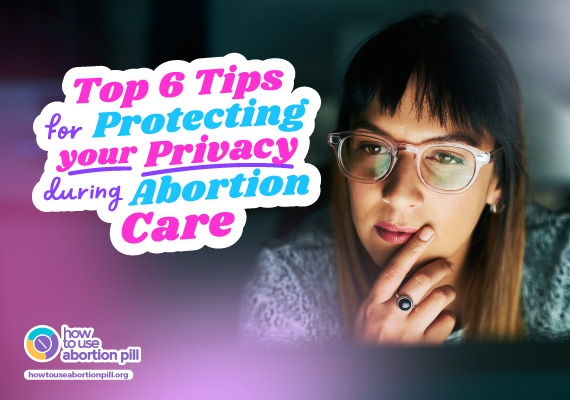Privacy, both in the offline and online worlds, is foundational to our abortion rights. It ensures that we can make decisions about our body without external interferences and threats such as stigma, harassment, or even legal attacks.
With abortion rights either missing or under attack in many places, it is important to think about privacy when getting an abortion – for our safety, autonomy, and well-being. In this blog, we will share top six tips on how to do that; so that when you get an abortion, you can be sure about your privacy and get the care you need with a peace of mind.
1. Limit Sharing Personal Information
Tip one: it’s crucial to carefully choose whom you confide in when discussing your decision to get an abortion. While it might be tempting to seek support from friends or family members, consider confiding only in those whom you trust implicitly and who have a genuine need to know. Even well-meaning individuals could inadvertently disclose your situation, potentially subjecting you to unwelcome judgment or scrutiny.
When interacting with medical professionals, prioritize sharing only the necessary information required for your care. Avoid volunteering additional personal details unless explicitly asked. Opt for private communication channels, such as direct messages or phone calls, rather than social networks and public forums. For emotional support, consider joining anonymous online support groups where you can share experiences discreetly and receive support from others who understand your situation.
2. Choose a Discreet Health Care Provider
Selecting a healthcare provider who prioritizes patient confidentiality is paramount. Before choosing a provider, conduct thorough research into their reputation and privacy practices. Look for facilities that offer private waiting and examination areas to minimize exposure to other patients or visitors.
Inquire about the staff’s training in privacy protocols and ask for specifics on how they secure patient data. Ensure the provider adheres to legal confidentiality agreements to safeguard your privacy effectively. Choosing a healthcare provider who respects and protects your privacy rights can significantly enhance your peace of mind during this time.
3. Use Cash for Transactions
Opting to pay for abortion-related expenses with cash rather than credit or debit cards can help prevent electronic records that might be accessible to financial institutions or other entities. Before your appointment, withdraw enough cash to cover expenses discreetly and manage receipts carefully to avoid leaving a traceable financial trail.
By using cash, you can minimize the chances of your financial transactions being linked to your medical procedure, thereby enhancing your privacy and reducing the risk of unwanted exposure.
4. Use Secure and Encrypted Communication
When discussing your abortion or related matters, prioritize using secure and encrypted communication channels. Encrypted messaging apps like Signal offer end-to-end encryption, ensuring that only you and the intended recipient can access the content of your conversations.
Consider using email encryption services such as ProtonMail for exchanging sensitive information with healthcare providers or support organizations. Avoid using insecure methods like standard SMS or unencrypted email, as these can leave your personal information vulnerable to interception or unauthorized access.
5. Secure Your Devices
Protecting your digital devices is crucial for safeguarding your privacy. Start by securing your devices with strong, unique passwords and enabling Two-Factor Authentication (2FA) wherever possible. Regularly update your device’s operating system and apps to patch vulnerabilities that could be exploited by malicious actors.
Ensure that you download apps only from reputable sources such as official app stores to reduce the risk of downloading malware. Remove any unused applications to minimize potential security risks and consider using a reputable antivirus program to further enhance your device’s security.
6. Clear Your Digital Footprint
Managing your digital footprint is essential for maintaining privacy. Regularly clear browsing history, search history, cookies, and cache from your devices to reduce the risk of your online activities being tracked. Utilize private browsing modes offered by web browsers to prevent the storage of sensitive information such as login credentials or browsing habits.
Additionally, consider using tools that anonymize your online presence, such as virtual private networks (VPNs), to further enhance your privacy when browsing the internet. By actively managing your digital footprint, you can reduce the chances of your online activities being linked to your personal identity.
Abortion and Privacy
Following these tips can help you protect your privacy in the offline as well as the online world, when getting an abortion. If you have questions or comments related to privacy or regarding the procedure of abortion itself, feel free to get in touch with us at info@howtouseabortionpill.org. At HowToUseAbortionPill, we provide accurate and up-to-date information about abortion, specifically abortion with pills, to help people get an abortion safely.
Our website is available in 26 languages, with information on what to consider before getting an abortion, where to get quality abortion pills, how to use them safely, what to expect, and when to seek medical help if necessary. Our website also provides information on the legal landscape related to abortion in different countries.
